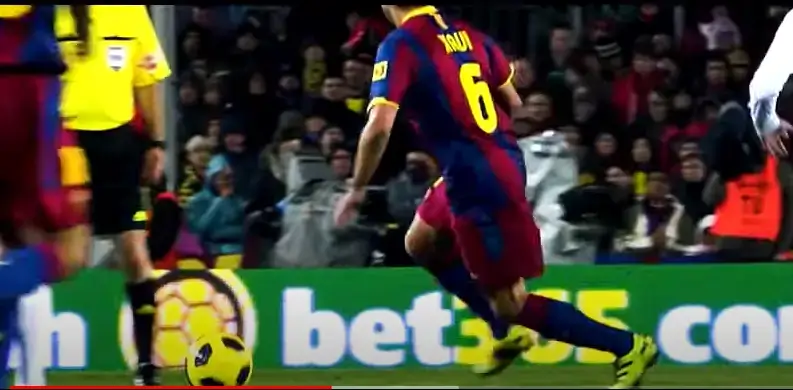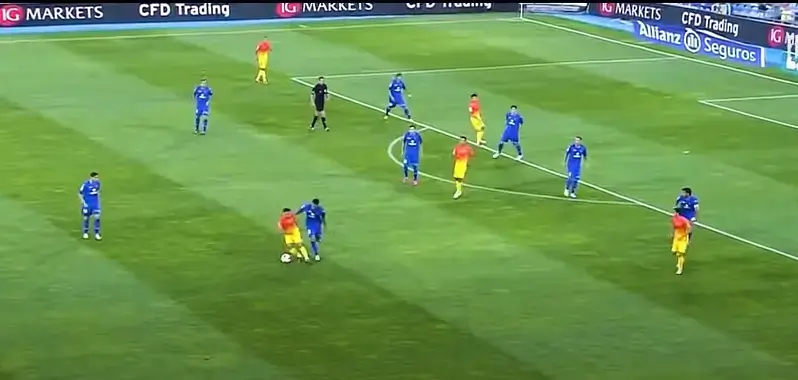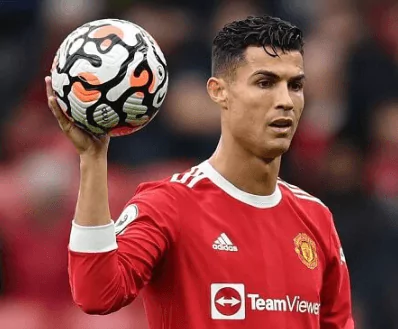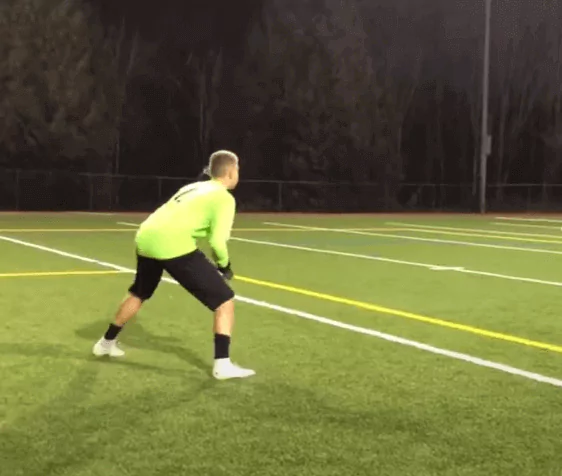Xavi Hernandez: The Maestro of Barcelona and Beacon of Modern Football
About Xavi Hernandez
Xavi Hernandez The Quintessential Midfield Maestro and Architect of Modern Football In the annals of football, few names resonate with the brilliance and tactical intelligence of Xavier Hernández Creus, known universally as Xavi. A central figure in FC Barcelona and the Spanish national team’s golden eras, Xavi’s approach to the game has influenced generations of players and coaches. His career spans over two decades, during which he redefined the role of a midfielder, blending technical prowess with an unparalleled understanding of football dynamics.
Early Life and Development at La Masia
Xavi Hernandez Born on January 25, 1980, in Terrassa, Spain, Xavi’s football journey began at the tender age of 11 when he joined La Masia, Barcelona’s famed youth academy. His early years at La Masia were instrumental, embedding in him a deep understanding of the tiki-taka playing style — a method characterized by short passing and movement, maintaining possession, and working the ball through various channels.

Rise to Prominence at Barcelona
Xavi Hernandez made his first-team debut for Barcelona in 1998 during the Spanish Super Cup. He quickly established himself as a pivotal player under the guidance of coaches like Louis van Gaal and later Pep Guardiola. Throughout his career at Barcelona, Xavi became the epitome of the club’s philosophy, playing a crucial role in the team’s domestic and international successes, including multiple La Liga titles and UEFA Champions League trophies.
Style of Play
Known for his exceptional vision, precise passing, and tactical intelligence, Xavi was the heartbeat of Barcelona’s midfield. His ability to read the game made him one of the best midfielders of his generation. His style was less about physicality and more about outsmarting his opponents, often being described as playing chess on a football pitch.
International Glory with Spain
Xavi’s brilliance was not limited to club football. He was instrumental in Spain’s golden era, contributing to their European Championship victories in 2008 and 2012, and their first-ever World Cup win in 2010. His performances during these tournaments were a masterclass in midfield dominance, helping to cement his legacy as a Spanish football legend.
Transition into Management
After retiring as a player in 2019, Xavi transitioned into management, taking over as head coach of Al Sadd in Qatar. His success at Al Sadd highlighted his readiness for bigger challenges, and in November 2021, he returned to Barcelona as head coach. His managerial approach reflects his playing philosophy, emphasizing possession, pressing, and tactical discipline.
Impact and Legacy
Xavi’s impact on football is immeasurable. As a player, he was a central figure in one of the most successful teams in the history of the sport. As a coach, he aims to instill the same values and tactics that defined his playing career. His legacy is not just in the trophies won or records set, but in the influence he has had on generations of players and fans who admire the beautiful game.

International Success with Spain
Xavi’s international career mirrored his club success. He was central to Spain’s transformation into a world-beating team, culminating in their victories in the European Championships in 2008 and 2012, and the World Cup in 2010. His performance in these tournaments showcased not just his technical abilities but also his leadership and ability to perform under pressure.
Tactical Influence and Philosophy
As a player, Xavi Hernandez was not only a central figure due to his performances but also due to his deep understanding of the game’s tactical aspects. His football intelligence allowed him to excel in roles that required controlling the game’s tempo, dictating play, and making strategic passes that seemed to defy conventional wisdom. This tactical acumen naturally transitioned into his coaching style. At Barcelona, Xavi implemented a philosophy that mirrored the principles he cherished as a player: control, possession, and proactive football. His approach is deeply rooted in the ethos of Johan Cruyff and furthered by Pep Guardiola, emphasizing a high-pressing game and maintaining possession with purpose.
Personal Life and Values
Off the pitch, Xavi’s personal life reflects his professional demeanor—focused, private, and grounded. Married to Nuria Cunillera, the couple has maintained a relatively low profile, focusing on family and philanthropy. Xavi’s values extend into his off-field activities, including his support for various charitable causes and youth development programs. His commitment to community and development initiatives shows his dedication not only to football but also to making a positive impact in the lives of others.
Mentoring and Youth Development
Throughout his career, both as a player and as a coach, Xavi Hernandez has been a mentor to younger talents. His time at La Masia left him with a profound belief in nurturing young players, which is evident in his managerial approach. He often emphasizes the importance of giving young players confidence and game time, which he believes is crucial for their development. This commitment to youth development is aligned with Barcelona’s long-standing tradition of fostering talent from within, reflecting Xavi’s desire to continue this legacy.
Cultural Impact and Popularity
Xavi Hernandez popularity extends beyond the realms of traditional football fandom. Recognized globally, his influence is seen in the way midfielders are evaluated and appreciated in modern football. He has been an ambassador for promoting football across different cultures, especially during his time in Qatar, where he helped bridge European and Middle Eastern football perspectives. His engagements in international football clinics and seminars further illustrate his global appeal and influence.
Future Prospects and Vision
Looking forward, Xavi’s vision for Barcelona and his broader aspirations in football are clear. He aims to restore Barcelona to its former glory, focusing on rebuilding the team’s strength through its youth system and reinstating its dominant playing style. His long-term goals include not only achieving success in terms of trophies but also ensuring that the club’s philosophy and values are preserved and enhanced for future generations.
Philosophical Influences and Coaching Idols
Xavi Hernandez coaching philosophy is deeply influenced by his mentors and the footballing ideologies that he was exposed to from an early age. Johan Cruyff’s vision of total football, which emphasizes an attacking game and possession-based play, heavily influenced Xavi during his formative years at Barcelona. Later, under Pep Guardiola’s stewardship, Xavi honed his understanding of tactical nuances, which became the cornerstone of his playing and coaching methods. His respect for these coaching legends is evident in his approach, where he blends Cruyff’s foundational philosophies with Guardiola’s innovative strategies, creating a modern yet historically rooted approach to football management.
Strategic Goals for Barcelona
As the coach of Barcelona, Xavi’s strategic goals extend beyond winning titles. He aims to rejuvenate the club by focusing on sustainable success, which involves promoting young talents from Barcelona’s youth academy and instilling a robust sporting culture that aligns with the club’s historic values. His vision includes creating a resilient and adaptable team capable of competing on all fronts, from domestic competitions to European challenges, while also ensuring financial stability and ethical governance.
Influence on Modern Midfielders
Xavi Hernandez legacy as a player is particularly evident in how modern midfielders are judged and valued. His playstyle, characterized by intelligence, anticipation, and the ability to control the flow of the game, has set a benchmark for evaluating midfield talents. Players like Thiago Alcântara, Marco Verratti, and even younger talents like Pedri Gonzalez are often compared to Xavi, illustrating his lasting impact on the role of midfielders in contemporary football.
Legacy Beyond the Pitch
Beyond his tactical and technical contributions, Xavi’s legacy is also about the ethical and cultural impact he has had on football. Known for his professionalism and sportsmanship, Xavi has been a role model for players and fans alike. His commitment to fair play and his advocacy for social issues through football have made him a respected figure not only in Spain but globally.
Looking to the Future
As football continues to evolve, Xavi’s ongoing contributions to Barcelona and the sport will likely influence future generations. His commitment to developing a sustainable model at Barcelona could set a precedent for other clubs facing similar challenges. Moreover, his efforts in promoting football globally, particularly in regions like the Middle East where he spent the latter years of his playing career, are part of a broader ambition to expand the game’s reach and impact.
Read Also: Rise of Lionel Messi.
Who is Xavi Hernandez?
Xavi Hernández, formally known as Xavier Hernández Creus, is a retired professional football player and current manager, widely recognized for his significant contributions to FC Barcelona and the Spanish national team. He is celebrated for his tactical intelligence, vision, and mastery of the tiki-taka style of play.
What achievements did Xavi Hernandez have with FC Barcelona?
Xavi was instrumental in one of the most successful eras of FC Barcelona’s history. During his tenure, he helped the team secure numerous titles, including multiple La Liga titles and UEFA Champions League trophies. His leadership on the field was pivotal to Barcelona’s domestic and international success.
What made Xavi’s style of play unique?
Xavi’s style of play was characterized by his exceptional ability to read the game, precise passing, and tactical intelligence. He was less reliant on physicality and more on outsmarting his opponents, often being described as playing chess on a football pitch due to his strategic approach to the game.
How did Xavi contribute to the Spanish national team?
Xavi Hernandez was a key player in Spain’s golden era, contributing significantly to their European Championship victories in 2008 and 2012, and their 2010 FIFA World Cup win. His ability to control the midfield and dictate play was crucial in Spain’s dominance in international football during this period.
What is Xavi Hernandez doing now that he has retired from playing?
After retiring from playing in 2019, Xavi transitioned into a managerial role. He initially took over as head coach of Al Sadd in Qatar, where he enjoyed success. In November 2021, he returned to FC Barcelona as the head coach, where he aims to restore the club’s former glory by emphasizing possession, pressing, and tactical discipline, reflecting the philosophy he cherished as a player.






